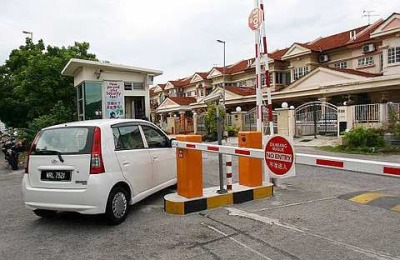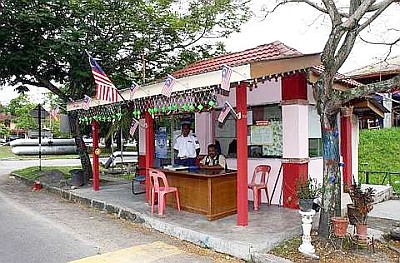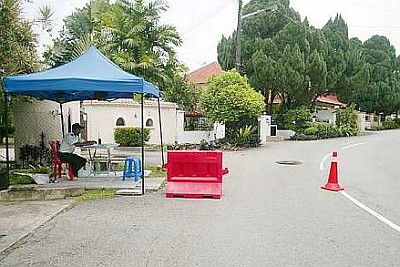|
Don’t let your
guard down
13/10/2009 The Star
By THO XIN YI
Photos by MOHD SAHAR MISNI and P. NATHAN
MORE and more housing areas in the Klang Valley are adopting the gated
and guarded security scheme in view of the rising crime cases.
Once the residents association worked out the details, a guardhouse is
built, the entry-exit points are closed, security guards are stationed at
strategic points and residents are issued car stickers.
While putting aside the debates on the legality of such schemes (it is
prohibited to obstruct public roads under the Street, Drainage and Building
Act 1974), the legitimacy and efficiency of the guards employed are worth
exploring.
 High cost: The services and facilities offered by
the security company vary depending on the money contributed by the residents.
High cost: The services and facilities offered by
the security company vary depending on the money contributed by the residents.
Those who are against the gated and guarded security scheme say they are
not convinced that their areas would be safeguarded by laymen donning the
security guard uniform.
Their worry is not without basis.
Kuan Chee Heng, who is the founder of a community policing website (http://cops.org.my/),
said some of the security companies do not have proper licences.
“As far as I am concerned, there are about 400 licensed security companies
as of February this year.
“They must be issued Licence 2 (a) under the Private Agency Act 1971 to
provide personal guard and protection for the safety of somebody else or safety
of property or other people’s business,” he said.
Even if the company has a licence, most of the guards are untrained and
thus not be allowed to work as security guards.
 Close watch: A proper guardhouse is essential to provide
shelter for the guards.
Close watch: A proper guardhouse is essential to provide
shelter for the guards.
“The Home Affairs Ministry only allows locals and Nepalese to work as guards,
but one can see foreigners like Bangladeshis, Pakistanis and Indians in the
housing areas now.
“They may be illegal or legal foreigners who have come into the country
using working permits for other jobs,” he said.
The reason they take up jobs as security guards instead of those stated
in their permits is because the salary may be higher.
However, their salary will still be lower than the locals or Nepalese.
Kuan claims the foreigners have taken a step further by setting their own
group and soliciting money from residents in exchange for their “security
services”.
“They do not have proper uniform, just reflective vests over their clothes,”
Kuan said.
To prove his point, Kuan took StarMetro for a drive around Puchong
and Serdang in search of the gated and guarded housing areas.
In Taman Lestari Putra, we spotted a Pakistani man, who appeared to be
in his late 20s, riding a motorcycle in his uniform.
We asked what kind of work permit he is holding and he replied, “Ladang
(plantation).”
 Eagle eyes: The security guards should be well equipped
to avoid being sitting ducks in case of emergency.
Eagle eyes: The security guards should be well equipped
to avoid being sitting ducks in case of emergency.
Kuan then enquired about his employment.
“I work for a security company, but if you can help, I want to start my
own company,” he said.
We also visited a neighbourhood in Bandar Puteri Puchong where the Indian
guard could no converse with us properly due to language barrier.
Kuan pointed out the danger of hiring foreigners as security guards – not
only that they are not accustomed to our laws and culture, they cannot make
police reports on the crime incidents and testify in court.
“They are not supposed to be working as guards, so naturally they wouldn’t
appear in front of the authority.
“Even though they are witnesses of the crime cases, they cannot give their
statements to the police,” he said.
This, coupled with the fact that they are untrained, proved that foreign
security guards cannot provide proper protection to the people who employ
them.
In fact, some local guards, like the ones serving a residential area in
Bandar Kinrara, admitted that they did not undergo training before working
as a security guard.
“I once asked a guard why he didn’t call 999 when a fire happened, and
he said his mobile phone did not have any credit left.
“If he had been trained, he would know that he can make emergency calls
under such circumstances,” Kuan said.
The effectiveness of the security service is often questionable.
Most sit at the entry-exit points of housing areas and salute just about
everyone who drives in.
Some guards also appear to be frail and old, thus unfit to serve as guards.
Kuan pointed out that the police would focus their manpower on those areas
that did not have such a security scheme, and thus those gated and guarded
ones must ensure that the guards were up to the mark.
He advised the residents to ensure that the guards employed by security
firms are either locals or Nepalese, and screen the guards by submitting their
names to the nearest police station.
“They must not have crime records. The guards should also take urine tests
periodically to ensure that they are not drug users.
“The insurance coverage for any losses or thefts occurred should also be
negotiated with the company,” he added.
Nonetheless, Kuan said the security guards might be exploited by the company
who employed them.
“They are not sent for training because it is costly – it is RM250 for
Level One of a basic course and RM700 for Level Two. For Nepalese, it is RM400
for Level One.
“They are underpaid and overworked, and most do not have EPF and Socso
benefits. They do not have insurance coverage, too,” he said.
He advised the residents to pay the security firms well in order to get
a proper security service in return, and provide proper shelter to the guards
instead of a makeshift booths.
All in all, Kuan stressed that one’s safety is not guaranteed in a gated
and guarded area.
“The community must work together in order to curb crime.
“Your neighbour is your first line of defence.
“Establishing strong ties and close rapport among the neighbours is more
important than anything else.
“Teach the elderly and children to be vigilant and call the local police
stations in case you notice any suspicious character,” he said.
The Selangor police hotline is 03-2052 9999.
|